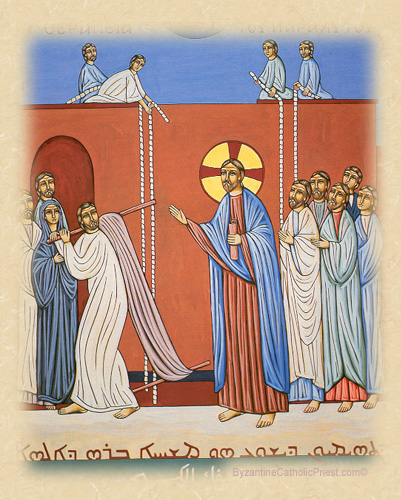The Great Fast: Time to "Man-Up".Heb. 1:10-2:3;
Mark 2:1-12. The Second Sunday of the Great Fast.* Our Venerable Father Gerasimus of the Jordan.
Return to ByzantineCatholicPriest.com. |
 10:43 AM 3/5/2012 — I remember the first time I preached to you about this Gospel lesson: I had spoken to you about the conduct of the palsied man’s friends; how, when they couldn’t get into the house where Jesus was, instead of blaming our Lord for not being accessible enough, they looked into themselves and found a way to reach our Lord, performing the gymnastic feat described in the passage. The lesson then was that the grace we need from our Lord to better ourselves and free ourselves from sin may not come easily or without effort on our part, but is there for taking none the less; that sufficient grace to do the right thing is always there: maybe not without pain, maybe not without some sacrifice, maybe not in the manner in which we may prefer; but it is always there. 10:43 AM 3/5/2012 — I remember the first time I preached to you about this Gospel lesson: I had spoken to you about the conduct of the palsied man’s friends; how, when they couldn’t get into the house where Jesus was, instead of blaming our Lord for not being accessible enough, they looked into themselves and found a way to reach our Lord, performing the gymnastic feat described in the passage. The lesson then was that the grace we need from our Lord to better ourselves and free ourselves from sin may not come easily or without effort on our part, but is there for taking none the less; that sufficient grace to do the right thing is always there: maybe not without pain, maybe not without some sacrifice, maybe not in the manner in which we may prefer; but it is always there.
Today I wish to look at a different aspect of this Gospel, and it comes from the last two sentences of the passage. Keep in mind that, whenever our Lord performs a cure, it isn’t just a physical malady he’s dealing with, but the spiritual illness as well. When he says to the palsied man, “Stand up...and go your way,” it’s more than just a command to get off the floor. It's a good example of how you can take the littlest thing said by our Lord and find a plethora of meaning.
Some of the most frustrating confessions you hear as a priest come from people in a very emotional state. They will blubber and snivel over how bad they feel about whatever it is they think they’ve done; and, of course, you have to be very kind and consoling and let them go through what they have to go through because those feelings are genuine. But it is hard sometimes to resist the temptation to reach through the screen and grab them by the scruff of the neck and just say, “Get over it!” And I end up giving them a very light, almost meaningless penance since, if they’re going to insist on brooding about it, they’ve already imposed on themselves a penance far worse than anything I could give them.
Maybe it’s me. Maybe I’m just not an emotional person, so I have a hard time relating. And you might think I'm reading too much into our Lord’s words. In any case, having witnessed everything the palsied man and his friends went through just that day,—and certainly mindful of the hard life the palsied man himself has lived up to that point—our Lord, having cured him, looks at him and says, “Stand up!” Don’t just lie there waiting for an emotional resolution to everything that has brought you to this wonderful day of forgiveness. Get up, get out, and get on with it.
And as peculiar as it sounds, I think that this could be a good point of meditation for us during the Great Fast, especially for those who are mustering the courage to go to confession after many years. Some of you may remember the preaching series we did on confession during Phillip’s Fast some years ago;—we've repeated it a couple of times over the last ten years—in which we discussed some of the reasons people like to give themselves for not going to confession; and one of them was the tendency that some of us have of wanting to make life harder than it needs to be. Sometimes we convince ourselves that the task ahead is hard because we're just afraid of it for some reason. How many of you who have children have told your kid to clean up his room; and you know that, if he just went and did it, it would take him ten minutes; but he can't do it. He's convinced himself that you've asked him to build the Brooklyn Bridge; but it's all in his head.
As providence would have it, you will have another priest serving for you all this month. I know all of you and you know me; and there are both pros and cons to a priest being so long in one parish; and I know I haven't been as available as I used to be the last few months. So, use this opportunity. You don't know this priest and he doesn't know you; so, take our Lord's instruction to the formerly palsied man for yourself: don't think about it. Just “man up” and do it!
Father Michael Venditti
* Most Orthodox and some Catholic Eastern Churches dedicate the Second Sunday of the Great Fast to the memory of St. Gregory Palamas, though this custom is considered optional in the Typicon in use in the Ruthenian Church. A more ancient tradition dedicates this Sunday to St. Polycarp; and a Typicon published in Rome as late as 1963 reflects this latter custom.
|

